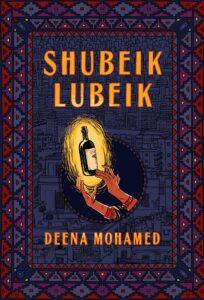And with this I’ve completed the reading for the 2024 Hugos nominees for Best Graphic Story! And what a way to round out the category! It won’t topple Wonder Woman Historia: The Amazons from the chokehold that book has on first place, but it sure comes close.
 Shubeik Lubeik is the Arabic for, essentially, “your wish is my command”, the typical line said by genies about to grant a wish. This astonishingly thoughtful graphic novel examines what life would be like if wishes — of indeterminate origin, though likely from djinn — were real. Gradually but cleverly, Deena Mohamed unfolds her entirely plausible world over the course of three interconnected stories, with the occasional interstitial to explain more of the history and politics of wishes.
Shubeik Lubeik is the Arabic for, essentially, “your wish is my command”, the typical line said by genies about to grant a wish. This astonishingly thoughtful graphic novel examines what life would be like if wishes — of indeterminate origin, though likely from djinn — were real. Gradually but cleverly, Deena Mohamed unfolds her entirely plausible world over the course of three interconnected stories, with the occasional interstitial to explain more of the history and politics of wishes.
The first story, while good, was also the weakest of the three, IMO, and only because of its ending. Aziza is a Cairene who’s always lived in poverty, first while watching her parents die of terminal illnesses, then while living with the husband she’s secretly very fond of. Abdo was her neighbor growing up, and he’s always done his best to bring a smile to her habitually solemn face. After he dies, she’s devastated. When she discovers that Shokry, a nearby kiosk owner, is trying to get rid of three fully licensed first-class wishes, she saves up money to buy one. Before she can use the wish, however, she’s arrested by a government that clearly wants her to give the wish over to them. She refuses to be bullied, enduring long days that turn to years in prison.
By far the most political of the tales here, this was a wonderful fable of what it takes to hold out for a better life in modern Egypt. My main issue with the ending was… well, I get it, but my religious and philosophical upbringings agree that it was not a smart choice. But that isn’t the point of the story. The point is that Aziza worked hard to get there and gets to choose whatever she wants, unhampered by an extortionate bureaucratic culture that readily takes advantage of its poorest and most vulnerable.
The second tale is Nour’s, and hit me harder. Nour is a university student specializing in wish studies, who also suffers from crippling depression. When they learn that Shokry is selling first-class wishes, they buy one before agonizing over exactly what to wish for. Nour comes from wealth and is mostly unchallenged in presenting as the nonbinary person that they are but, like many young people of their age and circumstances, doesn’t know how to get mental health therapy, which is too often laughed off as a first-world luxury for first-world problems. The way they figure out how to combine their journey to mental health with their wish is truly laudable, even as the story successfully explores the intersection of wishes with happiness and health.
Finally, you have the tale of Shokry himself. As a devout Muslim, he refuses to actually use wishes, until he learns that one of his closest friends, a Christian, is dying. He figures that Christians have no problems with wish-use and offers to give her the last of the wishes he owns. She refuses, despite his persistent efforts, before finally explaining to him why.
This was by far the most epic of the stories told here, even as it addresses both the history of wishes and the religious implications. Ms Mohamed has done an impeccable job of worldbuilding, extending her eye for both logic and magic forwards and backwards in time to examine the sociopolitical and economic implications of a world where wishes are not only real but can be bottled, commodified and sold. It’s an absolutely fascinating setting written with real intelligence and empathy.
And the art, which draws heavily on both Egyptian classical and contemporary comic art, is sensational! It perfectly balances the political, historical and fantastic themes of the interwoven tales to present a truly stunning urban fantasy of Cairo. Ms Mohamed’s versatility is breathtaking, and I can’t wait to read what she does next.
With this being my final read for the Graphic Story category, I’ll be voting as follows this year: Wonder Woman Historia: The Amazons; Shubeik Lubeik; Bea Wolf; Saga Vol 11; The Witches Of World War II (tho I’m still waffling on whether to rank this one higher than Saga 11,) then finally The Three Body Problem manhwa. Honestly, this may have been my favorite category of the Hugos that I’ve been able to get to this year. I’ll be publishing my last review for and roundup of the Best Novella category tomorrow, with reviews for the rest coming in more leisurely fashion after the voting date.
Shubeik Lubeik by Deena Mohamed was published January 10 2023 by Pantheon Books and is available from all good booksellers, including
